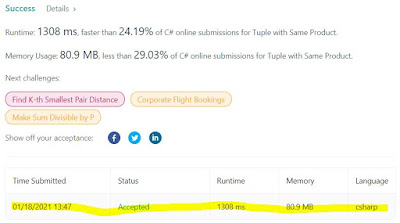Combinatorial to reduce to N^2
This is an interesting problem: Tuple with Same Product - LeetCode
Given an array nums of distinct positive integers, return the number of tuples (a, b, c, d) such that a * b = c * d where a, b, c, and d are elements of nums, and a != b != c != d.
Example 1:
Input: nums = [2,3,4,6] Output: 8 Explanation: There are 8 valid tuples: (2,6,3,4) , (2,6,4,3) , (6,2,3,4) , (6,2,4,3) (3,4,2,6) , (4,3,2,6) , (3,4,6,2) , (4,3,6,2)
Example 2:
Input: nums = [1,2,4,5,10] Output: 16 Explanation: There are 16 valids tuples: (1,10,2,5) , (1,10,5,2) , (10,1,2,5) , (10,1,5,2) (2,5,1,10) , (2,5,10,1) , (5,2,1,10) , (5,2,10,1) (2,10,4,5) , (2,10,5,4) , (10,2,4,5) , (10,2,4,5) (4,5,2,10) , (4,5,10,2) , (5,4,2,10) , (5,4,10,2)
Example 3:
Input: nums = [2,3,4,6,8,12] Output: 40
Example 4:
Input: nums = [2,3,5,7] Output: 0
Constraints:
1 <= nums.length <= 10001 <= nums[i] <= 104- All elements in
numsare distinct.
If you try to generate all permutations, you'll end up with N^4, since N=10^3, becomes intractable (10^12). But, using combinatorial you can "remove" one N^2, here is how:
1/ First compute on a cache the number of pairs that multiply to the same number - do it in N^2
2/ From this point iterate thru the cache and for each value you need to do a combinatorial "value 2 by 2", which is simply k!/(2! * (k-2)!), or simply k*(k-1)/2.
3/ But in addition to that there are 8 different permutations for each result in (2). So multiply it by 8
That should do it. Code is below, cheers, ACC.
public int TupleSameProduct(int[] nums)
{
Hashtable count = new Hashtable();
for (int i = 0; i < nums.Length; i++)
{
for (int j = i + 1; j < nums.Length; j++)
{
int m = nums[i] * nums[j];
if (!count.ContainsKey(m)) count.Add(m, 0);
count[m] = (int)count[m] + 1;
}
}
int result = 0;
foreach (int key in count.Keys)
{
int v = (int)count[key];
int c = (v * (v - 1)) / 2;
result += 8 * c;
}
return result;
}




Comments
Post a Comment